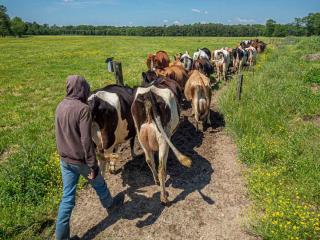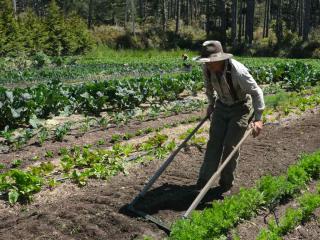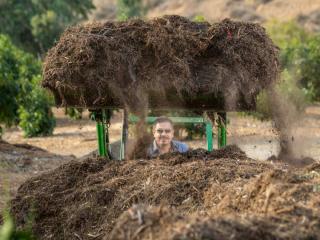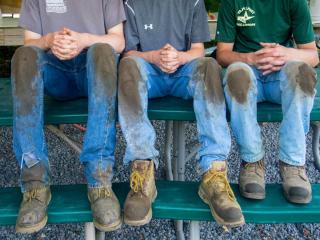

Samantha, in the midst of a career change, has a project to create the farm of her dreams. To achieve this, she volunteers in the south of France to in addition to her training as an agricultural technician. Samantha shares her WWOOFing experience and, boy, does it seem fun!
Marie, our journalist, takes us to meet Samantha to discuss her experience as a WWOOFer.
My name is Samantha, I’m 38 years old, and I live in Montpellier, France. I used to work as a special education teacher. Currently, I’m undergoing a complete career change. I want to pursue a “passion-driven” life, and I need to find a job that is more hands-on and connected to nature. And I should still earn a living!
WWOOFing is an incredible adventure that enables meaningful relationships while experiencing life in inspiring places.
I’m a hands-on person who relishes practical experiences. Thanks to Wwoofing, I can confirm and define my new career goals. I also learn skills that I’ll find useful in the future. As part of my career transition, WWOOFing brings me to meet people directly involved in this field. It’s a great way to build up my network.
 I primarily engage in WWOOFing nearby, in my own home region, but I occasionally venture a bit farther to discover new things. I select farms based on the activities they offer. That way, I can test and explore things that trigger my interest. I’m also seeking to understand how they operate and manage the place. Hosts often share about the challenges they face. The farm’s model and size are also criteria for making my shortlist.
I primarily engage in WWOOFing nearby, in my own home region, but I occasionally venture a bit farther to discover new things. I select farms based on the activities they offer. That way, I can test and explore things that trigger my interest. I’m also seeking to understand how they operate and manage the place. Hosts often share about the challenges they face. The farm’s model and size are also criteria for making my shortlist.
So far, I’ve only ever Wwoofed in France. I started at the Mas Perdu Farm, which focused on market gardening and orchards. Then I went WWOOFing at the Faucon Farm in French Provence. They specialize in growing and processing Aromatic and Medicinal Plants (AMP) such as marigold, sage, and hemp. I also spent time in the Tomine Plant Farm, which specializes in hemp with more machine-intensive methods. Recently, a short stay at Mas de Villetelle allowed me to learn a lot about lavender pruning and beekeeping. My most recent experience dealt with foraging of wild herbs, fruits and more at the Conquette Farm.
 Through WWOOFing, I’ve learned how to prepare and sow seeds, operate a tractor, harvest and process fruits and vegetables, and even bake bread. I’ve become familiar with vegetarian and gluten-free cooking. I also realized that it’s crucial not to work alone in this field to maximize chances of success and ensure you meet your own basic needs and comfort.
Through WWOOFing, I’ve learned how to prepare and sow seeds, operate a tractor, harvest and process fruits and vegetables, and even bake bread. I’ve become familiar with vegetarian and gluten-free cooking. I also realized that it’s crucial not to work alone in this field to maximize chances of success and ensure you meet your own basic needs and comfort.
WWOOFing has allowed me to expand the realm of possibilities. I’ve met people who have already launched their own projects, and learned specialized cultivation techniques. It helps me put real numbers in my own business plant, and complements my ongoing training in the Professional Certificate in Agricultural Business Management (BPREA).
It’s important to understand that WWOOFing is a moral agreement between two persons who commit to each other. The WWOOFer, for his or part, provides labor in exchange for accommodation and food. Typically, I helped out for 4 to 5 hours every day of the week. How the day unravels depends on the season and tasks at hand. For example, in summer, work is done mainly in the morning to avoid noontime heat, whereas in winter, the afternoon is much more comfortable to get work done!
 It’s difficult to choose one over all the others because they are all remarkable!
It’s difficult to choose one over all the others because they are all remarkable!
I will always remember learning to drive a tractor.
I felt like the king of the world when the farmer allowed me to ride on his brand new machine! I was giddy like a child again.
 In terms of equipment, I recommend being well-prepared for farm tasks: a warm coat for winter, boots, and gloves.
In terms of equipment, I recommend being well-prepared for farm tasks: a warm coat for winter, boots, and gloves.
From a more general perspective, WWOOFers should approach the experience with an open mindset and be very attentive. One great way to prepare for the stay is to reflect on what you expect from the experience. List down the questions to which you hope to find answers.
I appreciate the concept of WWOOFing. Mutual trust and sharing is the medium of exchange, it operates entirely without money. It’s all about sharing a different kind of wealth. In our capitalist society, a country’s health is often measured by Gross Domestic Product (GDP). But true wealth goes far beyond that! Quality of life, environmental preservation, and well-being are important criteria to consider, too. I prefer Bhutan’s approach, it tries to measure “Gross National Happiness” which is much more meaningful.
To gain a comprehensive understanding of WWOOFing, an interview with a farmer couple living in the French Hérault region complements Samantha’s testimony. Terri and Bernard have already welcomed over 200 volunteers and they’re eager for more!
Further reading: